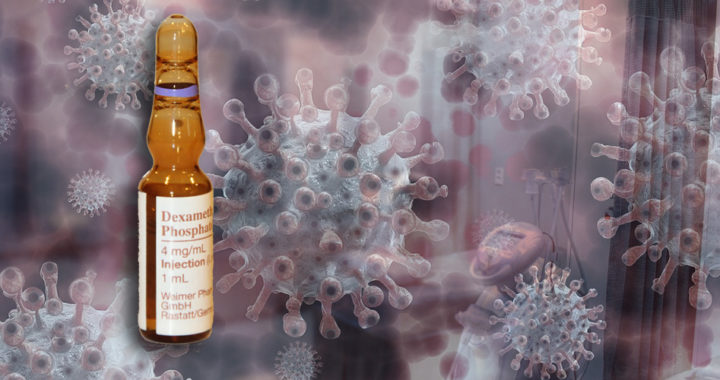Preliminary results from clinical trials in the United Kingdom suggested that low-dose dexamethasone could reduce death rates by about 30 percent of critically ill COVID-19 patients. The World Health Organization welcomed these results on 16 June 2020. Hence, the administration of this medication has been positioned as a viable and specific treatment option.
Possible Explanation of the Positive Effects of Dexamethasone Against COVID-19
Dexamethasone is a synthetic steroid under the glucocorticoid class of adrenal corticosteroid. Natural glucocorticoids are steroid hormones essential for the metabolism of macronutrients, as well as for mediating and regulating mediating immune response and inflammation. It is important to note that it contributes to the up-regulation of anti-inflammatory proteins and down-regulation of pro-inflammatory proteins.
The anti-inflammatory and immunosuppressive properties of glucocorticoids possibly explain how dexamethasone works against COVID-19. Essentially, once administered, the medication acts as a steroid hormone in the body that confers effects against inflammation.
Note that some severe cases of COVID-19 involve an overactive and potentially lethal immune response against the SARS-CoV-2, the specific coronavirus responsible for the disease, characterized by the overactivation of white blood cells that release an excessive amount of inflammation-stimulating molecules called cytokines in the blood.
The large presence of these molecules prompts widespread and systemic inflammation in the body. The phenomenon is called a cytokine storm. During this overactive immune response, the body essentially attacks its own cells and tissues, thereby causing organ damage and increasing the risk of multiple organ failures.
Remember that dexamethasone is an anti-inflammatory. In COVID-19 treatment, its use centers on the need to control systemic inflammation through the activation of anti-inflammatory proteins and deactivation of pro-inflammatory proteins. The medication essentially reverses the upshots of an overactive immune response.
Limitations of the Medication in the Treatment and Management of COVID-19
The purpose of administering dexamethasone to COVID-19 patients is to reduce the cell and tissue damage and mitigate the risk of multiple organ failures due to a cytokine storm. Hence, the World Health Organization noted that its use should be reserved to seriously ill and critical patients receiving treatment in a hospital setting.
It is important to highlight the fact that it is not a vaccine nor an antiviral drug. The medication would not work against asymptomatic individuals or those with mild to moderate symptoms of the coronavirus disease. In severe cases of COVID-19, it does not guarantee full recovery and survival, although it reduces the duration of ventilator use.
Dexamethasone also has side effects documented from its longstanding use as a medication against conditions ranging from severe allergies and asthma to chronic obstructive pulmonary disease and certain kinds of autoimmune and inflammatory diseases.
Notable side effects include insomnia, vertigo, increased appetite, weight gain, acne, hypertension, impaired skin healing, depression, and euphoria. About 10 percent of patients under long-term treatment develop cataracts. Furthermore, because it is an immunosuppressant, it increases the risk of infection from other pathogens such as other viruses and bacteria, and in patients confined in hospitals, it increases the risk of hospital-acquired infections. Photo credit: A Single Vial of Dexamethasone for Injection/LHcheM/Adapted/WIkiMedia/CC BY-SA 3.0
FURTHER READINGS AND REFERENCES
- Catanzaro, M., Fagiani, F., Racchi, M., Corsini, E., Govoni, S., and Lanni, C. 2020. “Immune Response in COVID-19: Addressing a Pharmacological Challenge by Targeting Pathways Triggered by SARS-CoV-2.” Signal Transduction and Targeted Therapy. 5(1) DOI: 1038/s41392-020-0191-1
- Coperchini, F., Chiovato, L., Croce, L., Magri, F., and Rotondi, M. 2020. The Cytokine Storm in COVID-19: An Overview of the Involvement of the Chemokine/Chemokine-Receptor System. Cytokine & Growth Factor Reviews. 53: 25–32. DOI: 1016/j.cytogfr.2020.05.003
- Hoffmann, E. 2020. “Dexamethasone Explained: Pharmacology and Applications.” Profolus. Available online
- Ledford, H. 2020. “Coronavirus Breakthrough: Dexamethasone is First Drug Shown to Save Lives.” Nature. DOI: 1038/d41586-020-01824-5
- World Health Organization. 22 June 2020. “WHO Director-General’s Opening Remarks at the Media Briefing on COVID-19.” The World Health Organization. Available online






